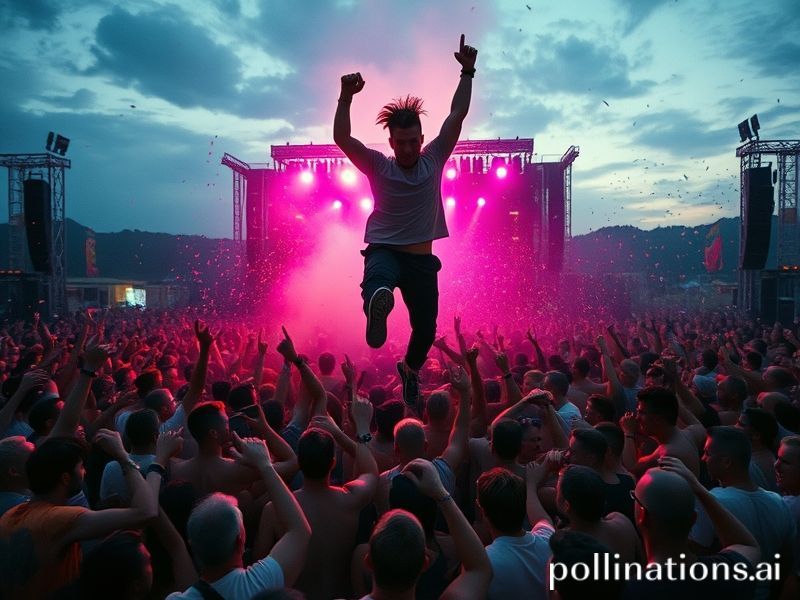Riot Fest: The UN of Nostalgia, Sponsored by Tinnitus and Overpriced Tacos
Riot Fest and the Global Art of Screaming Together
Chicago, USA – If aliens ever bothered to decode our civilization from orbit, they could do worse than start with Riot Fest: a three-day ritual in which otherwise functional adults pay triple-digit sums to stand ankle-deep in Midwestern mud and scream “I’m not okay” in unison with a man who now sells Funko Pops of himself.
From an international standpoint, the festival is less a music event and more a multinational treaty on late-stage capitalism. Delegations arrive from every continent sporting the same distressed denim and irony levels once reserved for Soviet defectors. The Japanese punks in meticulously recreated 1977 bondage trousers mingle politely with Brazilian metalheads who have flown 5,000 miles to hear Jawbreaker play the same three chords they could have streamed on the flight. Everyone agrees the tacos are overpriced; everyone buys three.
The global supply chain is on full display. The vegan corn dogs come courtesy of soybeans deforesting the Amazon, the bar’s mezcal is artisanal unless you ask too many questions, and the official merch is printed in Bangladesh, shipped through the Suez, and sold back to the same teenagers who just posted #FreePalestine from the queue. It’s a circular economy powered by nostalgia and nitro IPA.
Security is likewise multinational. A private firm staffed by moonlighting Ukrainian soldiers and bored ex-Marines from Ohio wanders the perimeter, sharing earbuds to compare notes on crowd-control techniques tested in Kyiv and Kenosha. When someone inevitably throws a full beer can at the sound desk, the Ukrainians mutter about grenade arcs while the Ohioans debate whether the thrower is worth the paperwork. Consensus: let Canada handle it.
The lineup itself reads like a UN roll call curated by someone who still owns a Hot Topic loyalty card. Manchester’s The Fall (well, half of them, and an iPad) shares a stage with Argentina’s Los Fabulosos Cadillacs, who in turn hand off to Japanese noise-merchants Melt-Banana. Meanwhile, a reunited ska band from Los Angeles reminds us that global warming is real because nobody this pasty should still be sweating in October.
Backstage diplomacy is delicate. French journalists debate whether the term “sell-out” translates correctly, while German photographers complain the lighting rig violates EU safety directives. A British podcaster asks the Colombian sound engineer if the bass could be “more existential,” and the engineer responds by turning it up until ribcages vibrate like cheap washing machines. Multilateral compromise achieved.
The festival’s carbon footprint is calculated, offset, and then promptly ignored—much like most Paris Agreement pledges. A pop-up booth offers festivalgoers the chance to buy a tree planted in their name somewhere in Indonesia; by Sunday the booth has run out of certificates and is just handing out QR codes that 404. Attendees console themselves that at least the wristbands are “biodegradable,” which is corporate speak for “will disintegrate sometime after the apocalypse.”
Yet for all the cynicism, something almost sincere happens when the sun sets and The Specials launch into “Ghost Town.” The flags come out—Chilean, Nigerian, Polish, Texan—waving together like a half-hearted Olympic ceremony sponsored by existential dread. For four minutes and ten seconds, global supply chains, algorithmic ticket pricing, and the heat death of the universe are temporarily suspended. Then the song ends, someone yells “Play Free Bird,” and the spell breaks faster than a cryptocurrency exchange.
By Monday the grounds look like a UN peacekeeping mission evacuated in a hurry: abandoned combat boots, single socks from three continents, and a single unclaimed passport from Luxembourg. The cleanup crew—largely Guatemalan, underpaid, and unimpressed—sweep up enough discarded vape pens to open a small smelting operation.
And so Riot Fest concludes another successful year of proving that, despite our differences, humanity can still unite in the noble pursuit of tinnitus and overpriced nostalgia. Somewhere in Brussels a bureaucrat files the incident under “soft power,” while in Beijing an algorithm logs the sentiment as “cautiously optimistic.” The rest of us just check our bank statements, wince, and book early-bird tickets for next September—because if the world’s going to hell, we might as well have a decent soundtrack.
The aliens, watching from orbit, conclude we’re not okay. But at least we’re harmonized.







